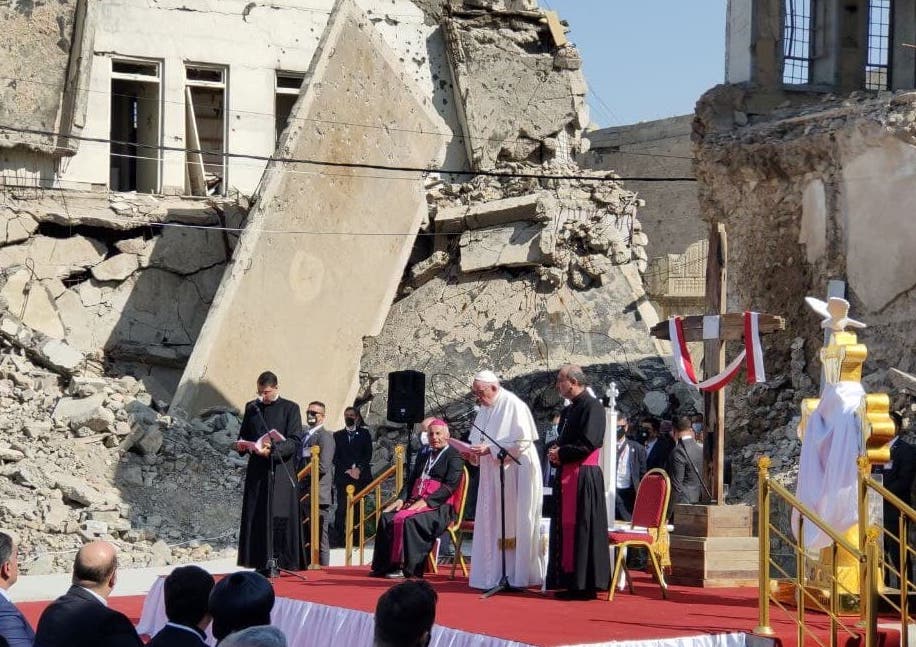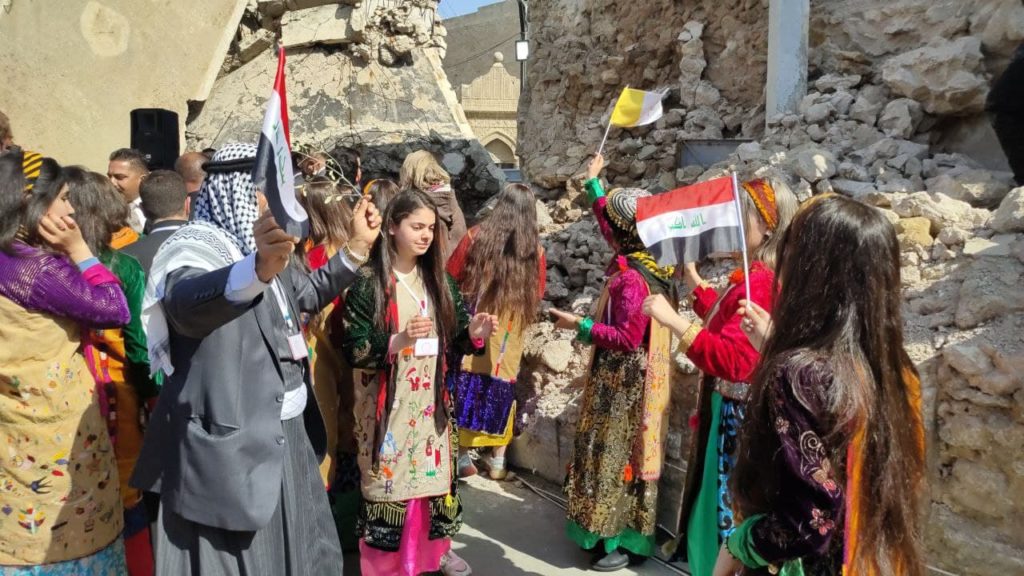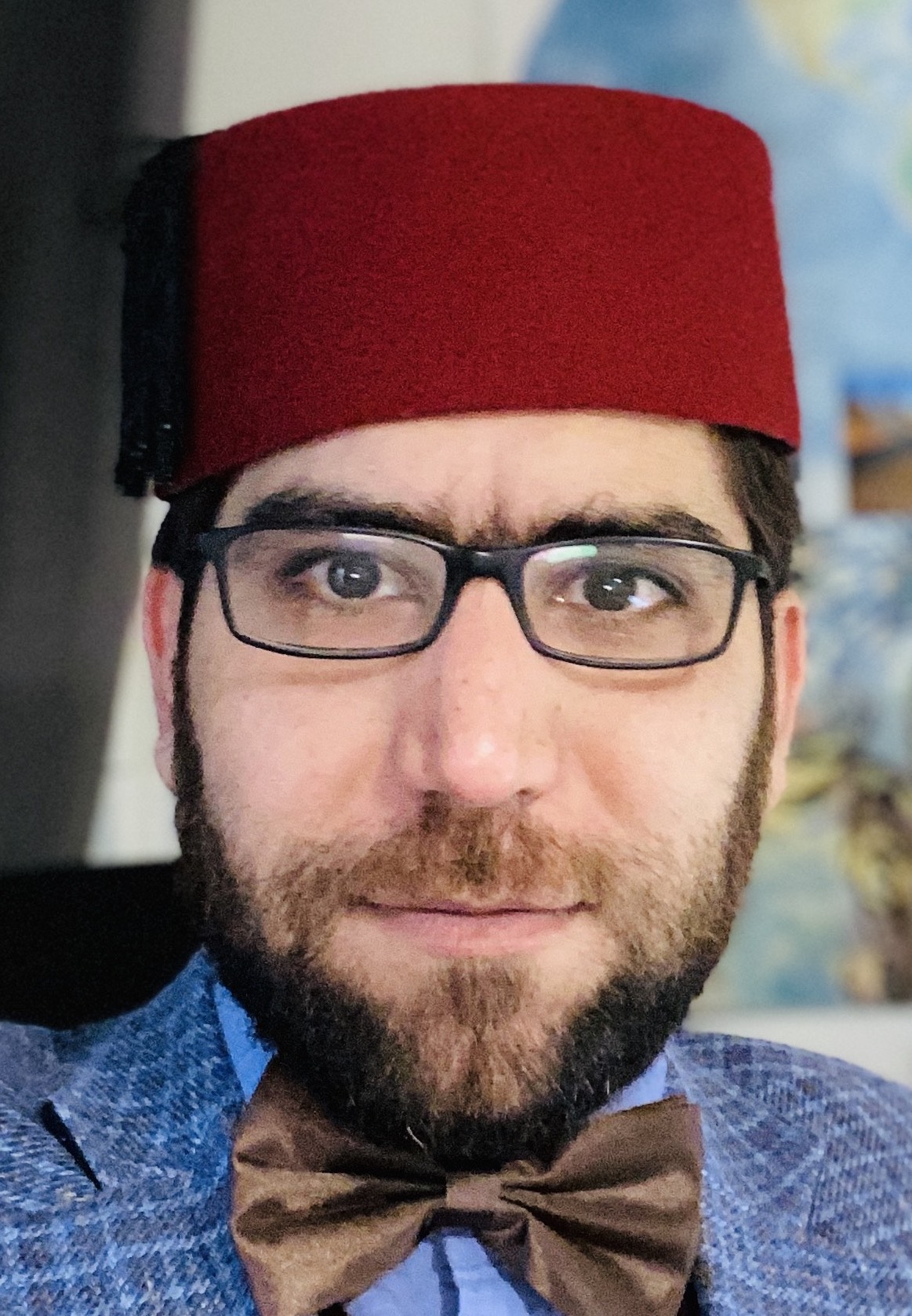
“Fraternity is more durable than fratricide,” the pope remarked in his address to a group of Mosulis of different faiths in his recent visit to Iraq. The pope, who experienced conflict and violence in Argentina earlier in his life, can easily understand to where political and religious violence leads. Yet, the Archbishop of Mosul, Najeeb M. Michael, who was standing next to him during the visit to Mosul on March 7, 2021, relayed that “[Pope Francis] shed tears, while taking moments of silence.”
The Christian population of Iraq, as well as Iraq’s other ethnic and religious minorities, have been dreaming of these words being uttered by the pope on Iraqi soil since the fall of Mosul in June 2014. In honoring his promise to visit Iraq at the earliest opportunity despite the pandemic, Pope Francis has sought not only to respond to the calls for help from Iraqi minorities, including those that have suffered from genocide, but also to emphasize the importance of interfaith dialogue and to show that actions mean more than empty words, political promises, and shallow human rights invocations. In June 2014, the pope’s presence in Iraq would have been beyond anyone’s wildest dreams.
Despite the “never again” mantra that has circulated since the Holocaust, other genocides continue to further frustrate anyone’s faith in humanity, from Rwanda to Myanmar, and to the rule of the Islamic State on Iraqi soil in 2014, one of the disasters-that-were-waiting-to-happen following the illegal US-led invasion of Iraq in 2003. Pope Francis made the “never again” mantra concrete through his actions when he visited Iraq. In carefully unmasking, in all his activities, the very root of the destruction of the Iraqi social fabric that led to the destruction of Mosul, he aimed to provide not only hope to Iraqi civilian worshippers, but most importantly to minorities across the world.
In the series of meetings and gatherings, and in the symbolism of the places that he chose to call upon during his short three-day visit, Pope Francis laid out a diplomatic message that could become the most significant Holy See policy since Vatican II, a message of the concrete connection of the Catholic Church to other faiths at a time of religious divisions worldwide, a message emphasizing the importance of interfaith dialogue for achieving peace nationally and regionally.
In his meeting in Najaf with Shi’ite Grand Ayatollah Ali al-Sistani, one simple picture of both religious leaders seated side-by-side provided visual counterevidence to not only the idea that the politicization of religion is inevitable, but also to the intransigency of the politicization of the ethnic and social divisions that have plagued Iraq since 2003. These divisions contributed to the rise of the Islamic State in Iraq during the rule of Obama administration-backed Prime Minister Nuri al-Maliki in the early 2010s. Under Al-Maliki’s rule, Sunnis were pitted against Shi’ites in a perceived government-sponsored brutality that echoed to many that of former President Saddam Hussein.

The Bush administration’s original sin of dividing Iraq along de facto religious lines through its infamous de-Baathification process led to civil war and the subsequent fall of Mosul in 2014. Years after this divisive colonial policy, the pope’s visit gestures to pathways to recover from this legacy. During the Najaf portion of his visit, the pope sought to place fraternity back into the limelight, and to encourage a move away from political Islam. In this groundbreaking meeting with Ayatollah al-Sistani, who is the second highest Shi’ite authority after Iranian leader Ali Khameini, and the most high profile advocate for the separation of religion from government, Iranian-style, Pope Francis might have performed a diplomatic miracle: that of beginning to help bridge the religious fault lines in Iraq by encouraging, for the first time, Ayatollah al-Sistani to appear in public, alongside the pope, in a show of support for interfaith dialogue and fraternity.
In the Iraqi Kurdish capital of Erbil, Pope Francis also met at length with Abdullah Kurdi, the father of the little Aylan, whose lifeless body was pictured on a Turkish beach in September 2015. Through this meeting, Pope Francis widened the scope of his diplomatic message to the rest of the world. His action subtly connected the dots between the invasion of a country, the division of its population, and the enduring alterations in the genetics of its social fabric, the result of which has often been more destruction.
In the same manner that depleted uranium weapons, Western-made and sold, durably altered the genetic fabric of civilian life, the partial annihilation of the second largest city in Iraq, Mosul, is a physical symbol of a far-reaching human tragedy. In Erbil, Pope Francis placed the onus of responsibility for the dreadful consequences of Western realpolitik on the shoulders of the many governments that sponsor international arms trade, only to close their borders to the collateral victims of conflict. He exposed the price that civilian populations pay for political decisions made elsewhere. Although seeking only to flee from economic hardships caused by war and destruction, many of these civilians have been condemned to suffer the dreadful fate of becoming “migrants,” the euphemistic term used to deny the collective responsibility of European nations for creating the very conditions that drive populations like those in Iraq out of their cherished homes.
His action subtly connected the dots between the invasion of a country, the division of its population, and the enduring alterations in the genetics of its social fabric, the result of which has often been more destruction.
The visit is not just a wake-up call to Iraq and the rest of the world, it is a demonstration of the faith, courage, and integrity of two religious leaders, and many more in their wake, whose coming together will restore not just our faith in humanity, but also our collective and individual responsibility to call on our leaders to start practicing another form of international relations, one more systemic, more humane, and more compassionate. Actions speak louder than words. Not all tears are crocodile tears. Never again is only possible if we all mean it.
Pope Francis included in his speeches in Mosul, Ur, Baghdad, and Erbil, many messages that called the government of Iraq to account. But on his way back to Rome he asked a question that the Iraqi government should take seriously: “Who sold the weapons to the destroyers and who is still selling them”? Answering this question requires a full review of the political and social structure of Iraq and its government’s position up until the post-ISIS period. Such a question is indeed one that should have been asked for a decade. Can anyone answer the pope?



I agree with almost everything that you have written, except for what I perceive as a gratuitous swipe at Obama’s administration. He at least committed US forces to saving lives in Sinjar and starting to fight Daesh in Mosul. George W Bush’s administration that occupied Iraq in 2003 and that signed the agreement to evacuate in 2008